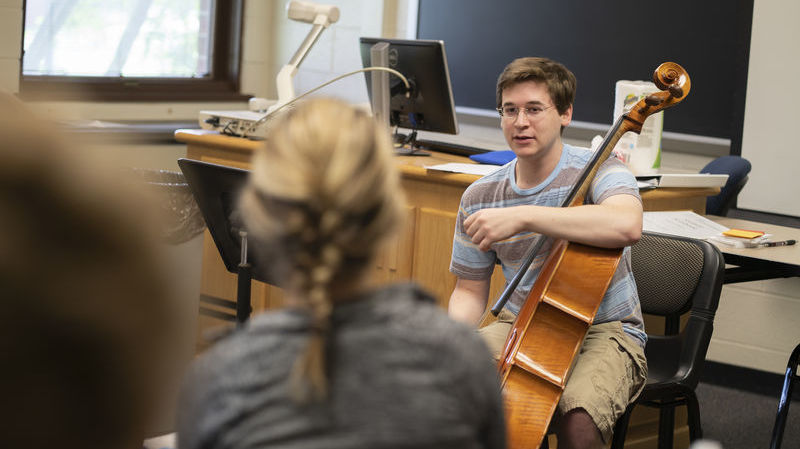
When Michael Newman sought support from Temple's Speech-Language-Hearing Center for his stutter, he already had long been practicing one coping strategy: his love for music and playing the cello.
“Music was my getaway from feeling pressured in speaking situations,” said Newman, who studied music as an undergraduate at Temple. “So when I played music and I practiced music it was, so to speak, a safe zone, where I felt most comfortable. It was a fantasy type of experience with music. It helped me get away from the negative feelings of speech.”
Still, Newman’s speech was negatively affecting his social life. In his sophomore year, he contacted the Speech-Language-Hearing Center to receive support and treatment for his stutter. Staffed by graduate students in the Speech, Language and Hearing Science program, the center offers people with communication disorders a range of services: articulation therapy, language therapy, aural rehabilitation for people with hearing impairments, programs for bilingual clients, and the stuttering prevention and intervention clinic that Newman attended.
After being referred to the clinic by a therapist, Newman said he was nervous to take the first step of undergoing an evaluation, but his feelings about the process changed after he realized the clinic would help him to feel more confident.
“Therapy really focuses on the negative impacts that stuttering has on a person. And with Michael, he definitely had a lot of negative impacts,” said Brianna Goltwalt, the Speech-Language-Hearing student who worked with Newman. “He wasn't as social as he wanted to be, and he was really afraid of interviewing for certain things; it impeded him from talking to people, it impeded him from talking on the phone, and he experienced a lot of stress and tension because of it.”
According to Goltwalt, people often have the idea that they need to work towards eliminating their stutter, but that isn’t the best approach or even a realistic goal. Instead, they worked to identify barriers and situations Newman in which his stuttering was especially prevalent, such as when he spoke on the phone. They also worked on relaxation techniques to ease stress in these triggering situations so that the stutter would not worsen.
“Our goal was for him to be somebody who was in control of his speech, in control of his stuttering, and a successful person who stutters,” said Goltwalt.
Now, Newman says that he can talk on the phone with far fewer nerves than before. “It’s great what they’re doing, that they can make a difference in someone’s life like that,” he said.
But that wasn’t the end of Newman’s interactions with the clinic: A year after graduating from Temple in 2016, he returned to participate in the Speech-Language-Hearing Center’s Speak Now camp, a one-week summer education camp for students ages 10 to 15 who stutter, where he worked as a mentor for two years in a row to help students cope with their own stutter.
“The students in the camp asked a bunch of questions, and I was able to share my story and my experiences,” said Newman. “The second time, I actually brought my cello.”
